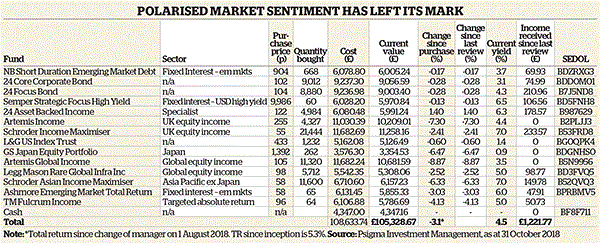Manager reveals new funds in his high-yield portfolio
28th November 2018 10:49
by Holly Black from interactive investor
Our higher-income portfolio has been overhauled under its new manager to help it contend with cooling market sentiment and instability. Holly Black has the details.

This article was written in November for the December 2018 print edition of Money Observer. Market data and share prices are likely to have since changed.
As the end of the year approaches, it's out with the old and in with the new for our higher-income portfolio. New manager Tom Becket, chief investment officer at Psigma Investment Management, has overhauled the portfolio.
He says:
"In markets as uncertain as those we are currently experiencing, I don't want to hold anything I don't know really well or don't have complete confidence in. I've brought in funds I know inside out."
The portfolio aims to generate a relatively high income – it has a target yield of 5% – but achieving that is no easy feat at a time when interest rates remain near rock-bottom and fixed-income assets yield little.
Previously, the portfolio yield was hovering at just above 3%, but it has now leapt to 4.5%. However, income-seekers are having to take on more risk than they have had to historically in order to generate an inflation-beating yield.
Becket says:
"It's a time to be very selective about what you invest in. In fixed income, that means choosing the specific regions, assets and durations you want exposure to."
All the holdings are open-ended funds. With volatility returning to markets, Becket wants all his investments to be as liquid as possible. Our change of manager occurred on 1 August, so we have four months of performance on which to judge our new holdings, which were all brought in on that date.
There are two emerging market debt funds in the group. NB Short Duration Emerging Markets invests in a mixture of quality government and corporate bonds across Malaysia, China and Mexico, among other countries. It generates a yield of almost 4%. Its focus on higher-quality debt means it should be a good choice for capital preservation, even if sentiment towards emerging markets – which is already negative – worsens. In its first four months in the portfolio, the fund’s value edged down by 0.17%.
The Ashmore Emerging Total Return fund is a higher-octane emerging market debt fund. Becket says:
"It gives us a contrarian investment in the space. Most investors seem to hate emerging markets at the moment, and that makes it a good long-term opportunity in my view."
To enlarge table, please click here.

US exposure
These are not the only controversial holdings in the portfolio: Semper Strategic Focus High Yield invests in US mortgage-backed securities.
"The asset is associated with the financial crisis, but the industry has come on a long way since then," says Becket. He argues that these assets are a way of getting exposure to the robust US economy, which is supported by rising wages and house prices.
He adds: "There is a lot more regulation in this space now, and you can go into the details of every mortgage the portfolio contains, which is something you can't do with other fixed-income assets. It is the only holding in the black over the past four months: up 1.4% and with one of the highest yields in the portfolio at 6.5%.
There are two so-called maximiser funds in the portfolio, which will help boost the overall yield. These funds use derivatives to enhance their income. The instruments they use can limit the amount of growth they achieve, so they may lag in rising markets.
However, Becket says they should thrive now. Speaking about the Schroder Asian Income Maximiser fund, Becket says:
"It might not be the fund you would pick if you were looking for pure growth, but a 7% yield is very appealing. The fund is run by a high-quality, experienced team, which is what you need when markets are volatile."
Infrastructure investments have been popular among income-seekers for some time, but the Legg Mason Rare Infrastructure fund is a little different. Rather than owning and managing assets and contracts itself, it invests in the companies that do so. It's the equivalent of a property securities fund, which owns shares in property firms rather than bricks and mortar.
Becket says:
"This is a dependable fund in difficult markets and you can see that in its recent performance. Infrastructure provides an attractive income stream tied to inflation."
Two holdings in the group have much lower yields: L&G US Index Trust and GS Japan Equity Portfolio yield 1.4% and 0.9% respectively. Income is typically harder to find in current markets, but Becket has incorporated them into the portfolio to provide diversification and a growth boost.
There are two UK-focused holdings in the portfolio: 24 Core Corporate Bond and Artemis Global Income. Unlike many investors, Becket is not put off his home market because of what he calls "Brexit nonsense".
He says negative sentiment towards the UK means you can get a higher yield on investments at home than elsewhere. "I call it the Brexit premium, and it's something I am taking advantage of," he says.
It has not been an easy time to launch a portfolio, though. In October the FTSE 100 index suffered its worst month in more than three years. That is evident in the negative performance that most holdings in the group have experienced over the past few months.
However, Becket is confident that in the final weeks of the year, volatility should ease and these funds will start to prove their worth.
He says: "It is still possible to have a portfolio you can depend on that achieves a healthy income. It's going to be much more difficult for investors than it has been for the past decade - the broad-brushed approach that has been fruitful in recent years just isn't going to work anymore; it's time to be very specific."
Full performance can be found on the company or index summary page on the interactive investor website. Simply click on the company's or index name highlighted in the article.
This article was originally published in our sister magazine Money Observer, which ceased publication in August 2020.
These articles are provided for information purposes only. Occasionally, an opinion about whether to buy or sell a specific investment may be provided by third parties. The content is not intended to be a personal recommendation to buy or sell any financial instrument or product, or to adopt any investment strategy as it is not provided based on an assessment of your investing knowledge and experience, your financial situation or your investment objectives. The value of your investments, and the income derived from them, may go down as well as up. You may not get back all the money that you invest. The investments referred to in this article may not be suitable for all investors, and if in doubt, an investor should seek advice from a qualified investment adviser.
Full performance can be found on the company or index summary page on the interactive investor website. Simply click on the company's or index name highlighted in the article.
These articles are provided for information purposes only. Occasionally, an opinion about whether to buy or sell a specific investment may be provided by third parties. The content is not intended to be a personal recommendation to buy or sell any financial instrument or product, or to adopt any investment strategy as it is not provided based on an assessment of your investing knowledge and experience, your financial situation or your investment objectives. The value of your investments, and the income derived from them, may go down as well as up. You may not get back all the money that you invest. The investments referred to in this article may not be suitable for all investors, and if in doubt, an investor should seek advice from a qualified investment adviser.
Full performance can be found on the company or index summary page on the interactive investor website. Simply click on the company's or index name highlighted in the article.